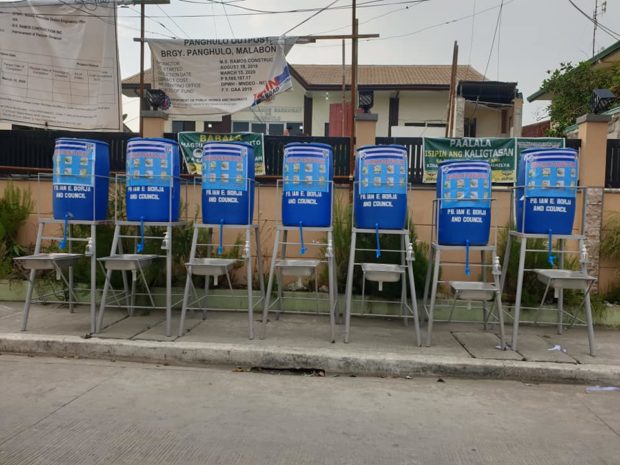COVID-19 is threatening everyone today. While the prospect of battling the COVID-19 pandemic is daunting and exhausting, there are still solutions that we can work on as citizens. We can engage in tactical urbanism approaches, or small, more personal solutions from which our communities can benefit.
So what can we do to help fight the disease? Here are some creative solutions that have been used in different barangays in the Philippines, and even around the world.
Designate spaces to encourage washing and sanitation
Especially in poor, crowded areas, access to water is difficult. Providing water by placing portable hand washing stations, water drums or other refillable containers in accessible spaces can help many families stay clean. If you can mix bleach solutions at home (which is just water and bleach), donate properly labeled containers so more areas and public surfaces can be sanitized.
Cycle, make streets safer for frontliners
Many doctors, nurses, health workers and maintenance personnel of hospitals have been forced to move about the city using borrowed bikes. But with private cars rushing about, their safety becomes an issue, and we cannot afford having more medical workers removed from the line of defense. Designating lanes protected with planters, cones, or cheaper cardboard cylinders can make life much easier for them to function. It also helps to move generally anyone who has urgent needs. Ask your local authorities to look into this. (The City of Bogota has shifted to necessary cycling so that people will not be crammed in public transport.)
Temporary shelter can be deployed on parking lots. Rendering by UAP-EP, as published in the study Developing Alternative Temporary Shelter (ATS) Solutions as Interim Coping Mechanism for the Displaced among Urban Poor Communities.
Support alternative temporary shelters
Unused city spaces, such as vacant parking lots, plazas, basketball courts and church spaces, can be used to set up temporary shelters. Wider spaces also encourage people to practice social distancing. If by any chance you have a folding bed, donate it to these shelters.
Organize, mobilize
We have organized groups at the local levels all over the country, which can be mobilized to aid in the production of medical and basic supplies. An example is how women’s groups are sewing washable masks and distributing it to the communities in need. If you are part of a group, think of your strengths and what similar efforts you and your colleagues can do, and if you can do it from home.
Plant edible food
It isn’t exactly the fastest solution, but it won’t hurt to have some basic plant ingredients with you. Greens, calamansi, garlic, and ginger are easy to grow and can be good for your health. Encourage urban gardening, document your how-to and share your progress to encourage the practice online.
Use your skills
We see how chemists are mixing ethyl alcohol and creating acetate masks to donate for frontliners, how industrial designers, scientists and engineers are working on test kits and sanitation tent designs, and how statisticians are working on contact tracing. You can contribute something, too. Skills such as cooking good food can help jumpstart soup kitchens and deliver healthier food to the homeless or the urban poor. If you speak several Filipino dialects, help translate the health advisories and boost the information drive of the Department of Health. If you can sketch, cartoonify what is happening in the communities and share it, so actual stories can be heard. If you meditate, schedule online sessions and help those who need mental and emotional support. Everyone can play a part.
Acetate masks and plastic walls are used to distance people. In Barangay Silangan, Quezon City, some buyers purchase hot meals. Photo by Fr. Gilbert Billena of the San Isidro Labrador Parish
Share your resources
Do you have a printer at home? Help print shuttle point routes from your local government, and post them on visible spaces when you go out to buy supplies. Not everyone has social media where these important information are circulated. Do you have time after watching Kingdom 2 on Netflix or doing a ton of Tiktok videos?
If you’re close enough, see how you can help in the repacking of rice or farmer produce (if your local government is supporting farms) so that food can be distributed faster to people who need it. Or give to donation drives—so many are ongoing right now, it only takes a few clicks to send help. Do you have an extra bar of soap, or some bread and bottled water at home? Make your own care package and donate it to a neighbor who needs it—it could be the taho vendor or the fruit dealer by your corner.
Let’s do our part, and remember to be safe and protected when we do so. Also please be responsible in contributing to solutions if they are outside your home, especially if you live with vulnerable people. We are only safe if our community and our city are safe. Bayanihan always works wonders, and we can use it to save lives against COVID-19.
